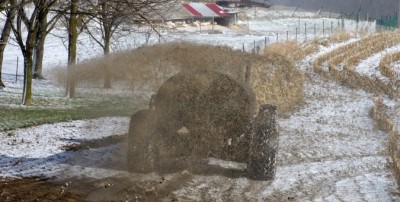Winter Manure Spreading Restrictions

Excerpt from "Winter manure restrictions in effect" in American Agriculturist by C. Torres & J. Kiel
In New York, there is no winter ban, but the following rules apply:
- Winter manure spreading must be in accordance with the Cornell University Nutrient Guidelines, NY P Index, NY NLI and RUSLE2.
It must be based on a check of the 48-hour weather forecast to assess if rainfall or temperatures are predicted to cause snowmelt or runoff conditions.
Manure must not be applied to soils designated by the soil survey as "frequently flooded."
Winter manure spreading must be in accordance with Section 1 in "Manure and Groundwater: The Case for Protective Measures and Supporting Guidelines" for fields with soils less than 40 inches deep over carbonate bedrock.
Manure can't be spread within a 100-foot flow path distance from surface waters, surface inlets, springs or sinkholes.
Manure can't be spread within 100 feet of wells.
Manure can't be applied in concentrated flow areas, such as well-defined channels within fields.
Cornell Universities revised winter and wet weather manure spreading guidelines to reduce water contamination risk, which can be found by clicking here https://bit.ly/3nVUttL, summarizes what factors to consider to avoid water contamination during winter and wet weather conditions.
Producers should work with their AEM Certified Planner to find ways to avoid having to spread during high risk and emergency situations. Even if the NY P Index or Nitrate Leaching Index allow for spreading on particular fields during a certain time of year, the decision to apply or not on any given day needs to be based on actual field and weather conditions. Sufficient manure storage and a well-designed and executed winter spreading plan can go a long way toward reducing losses. Actual manure application decisions should consider:
1. Near-term weather: Rain or snowmelt in the forecast?
2. Actual field conditions: Extent of snowpack, ice layer, frozen soil, or soil saturation.
3. Use of lower risk fields, identified in advance: On farms where some application is planned during winter months, work with your AEM Certified Planner to identify a significant acreage of lower risk fields for those applications (e.g., no history of runoff or groundwater issues, limited surface connection to streams/ditches, mild slopes, no concentrated flows, no karst or shallow soil features, high crop residue or surface roughness, etc.). Also with your Certified Planner, identify a smaller set of fields to save for emergency application fields or pile areas where manure can be taken in case of unexpected extreme conditions. Fields should have no history of runoff problems, be less than 5% slopes; as far as practical from any stream, ditch, well, or karst feature - preferably at least 300 feet; be accessible for equipment; have minimal runoff from upslope areas; and not be prone to frequent or occasional flooding (see NRCS 590 Standard for temporary manure pile siting).
4. Beneficial application management to further reduce runoff risk: Injection or incorporation, reducing application rates, introducing or increasing setback distance, applying to lower risk fields, applying to fields with ground cover such as hayfields, applying manure over a period of several days as opposed to all in one day, etc.
5. Access to manure storage: Including working with your Planner to develop more storage capacity if finding that applications during higher risk conditions are becoming commonplace. Also, consider asking a neighbor if they have storage room to spare.
Accurately predicting weather is difficult. The guidelines in this document cannot prevent all runoff, but increasing awareness of the conditions that contribute to runoff and development and implementation of winter spreading plans based on these guidelines should reduce the risk of significant runoff and water quality violations. It is most important that farm managers take steps to observe fields after applications to learn from what happens and to adjust practices accordingly. Further, producers and planners should carefully evaluate existing storage capacity to ensure adequate storage to avoid application during high risk conditions year in and year out, and consider that wet field conditions may need to be evaluated differently from concrete frost, ice or snow pack.
Upcoming Events
Boots in the Barn: Cornell Dairy Research Updates
January 13, 2026
January 20, 2026
January 27, 2026
February 3, 2026
February 10, 2026
February 17, 2026
February 24, 2026
Join us for some or all!
New York Certified Organic (NYCO) Field Crops and Dairy Meeting
February 10, 2026
Geneva, NY
Piglet Health 101
February 13, 2026 : Piglet Health 101 - Batavia, NY
Batavia, NY
This free workshop from the New York Pork Producers offers hands-on training in essential piglet care and processing practices, led by industry veterinarians from Passion for Pigs. No matter your experience level, this training offers takeaways for both new and experienced producers.
Announcements
Cows, Crops & Critters Newsletter Sponsorship
TRYING TO REACH GROWERS AND AGRIBUSINESSES IN OUR SOUTHWEST REGION OF NEW YORK?Weekly Email Update: Shared with 625+ households who have signed up with our program.
Monthly Paper Mailer: To reach our stakeholders and farmers who lack internet access, we send out a monthly mailer where your company's logo and contact information would be featured with a mailing list of 330+ households.
If you sponsor our weekly and monthly publications you reach approximately 955 households.





